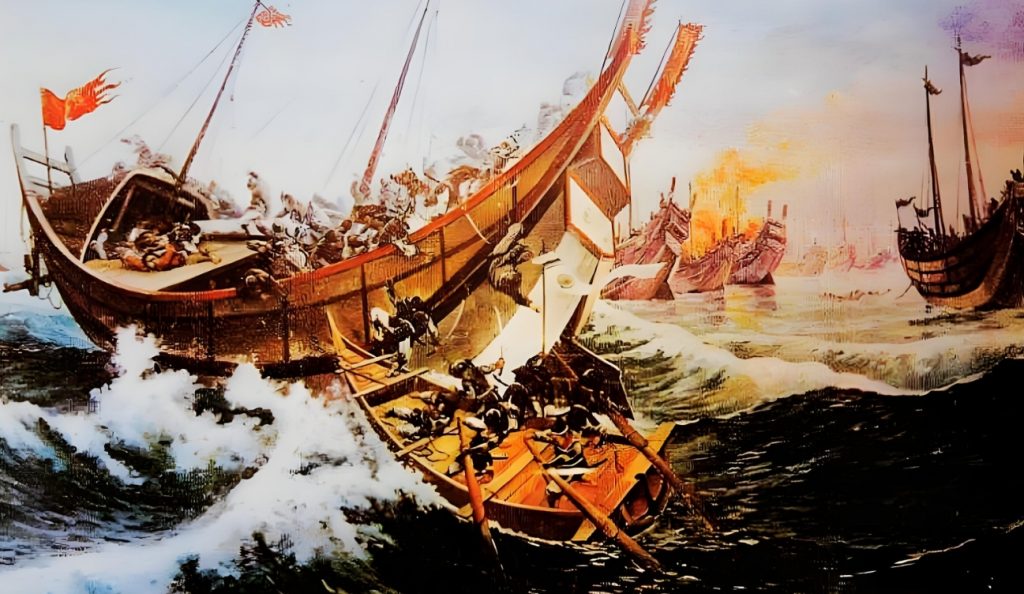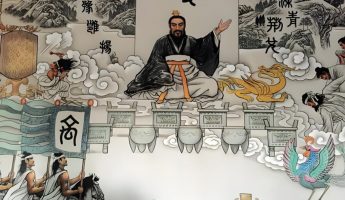The Song Dynasty can be said to have a tragic fate in history. Due to the basic national policy of valuing literature over military power in the court, the military strength of the Song Dynasty was very weak. The enemy came knocking on the door, and the attitude of the two Song dynasties was to focus on buying peace and trying their best to please their opponents in exchange for survival. Therefore, they experienced two tragic experiences of national demise and humiliation.
If the downfall of the Northern Song Dynasty was a great shame and humiliation for the Chinese nation, then the downfall of the Southern Song Dynasty is undoubtedly the most tragic experience for the Chinese nation in history. Starting from the founding emperor Zhao Gou, the Southern Song Dynasty did not learn from the lessons of the downfall of the Northern Song Dynasty. In order to consolidate its ruling position, the court remained wary of military commanders at all times, and coupled with the prosperity of the country, the Southern Song Dynasty still adopted the diplomatic policy of the Northern Song Dynasty to buy peace from foreign countries.
At this time, the Mongolians had rapidly risen under the leadership of Genghis Khan. The Mongolian cavalry is brave and skilled in battle, sweeping across the Eurasian continent and invincible. The Jin Dynasty had already been shattered by the Mongol cavalry, and the wealthy and oil-rich Southern Song Dynasty naturally became the next target of attack for the Mongols. However, during the initial attack on the Southern Song Dynasty, the Mongol cavalry faced fierce resistance from the military and civilians of the Southern Song Dynasty. Mongol Khan Mengge was killed in action during the attack on Diaoyutai, and the city of Xiangyang, which was defended by Lv Wenhuan, Guo Jing, and others, could not be captured for a long time.

So Kublai Khan made the decision to split his army into two routes to destroy the Song Dynasty. A Mongolian cavalry quietly bypassed the southwest and first destroyed the Dali Kingdom established by the Duan clan in Dali. They then marched north from Yunnan to respond to the Mongolian cavalry’s dual line attack on the Southern Song Dynasty. In this situation, the isolated and helpless Xiangyang City ultimately fell. The entire territory of the Southern Song Dynasty was exposed to the iron hooves of Mongolia, so the downfall of the Southern Song Dynasty became the trend. Quickly, the Mongols advanced eastward and conquered the capital of the Southern Song Dynasty, Lin’an, in one fell swoop. The military and civilians of the Southern Song Dynasty fled south with the emperor.
During the process of fleeing south, Wen Tianxiang, who was responsible for organizing the righteous army to resist the Mongol army, was defeated and captured. After learning the news, various prefectures and counties also surrendered. Soon, the Mongol cavalry formed a encirclement of the Southern Song Dynasty’s exiled court, and the location of this encirclement was at Yashan. At that time, the commander-in-chief of the Yuan army was Zhang Hongfan, a Han Chinese. After his defeat, he surrendered to the Yuan dynasty and became a vanguard officer of the Yuan army. Zhang Hongfan, as the vanguard, led 20000 elite Mongolian soldiers and 400 warships to surround the cliff mountains surrounded by the sea on three sides. On the cliff are the last emperor of the Southern Song Dynasty, Zhao Yang, who was only 8 years old, his adoptive mother, Empress Dowager Yang, loyal courtiers Lu Xiufu, Zhang Shijie, and 200000 Southern Song soldiers and civilians who fled with the court. Although the exiled court of the Southern Song Dynasty had an absolute advantage in terms of numbers, most of them were family members accompanying the army, and there were not many truly combat capable people. Compared to the 20000 elite Mongolian soldiers, these 200000 people were vulnerable.
After observing the terrain, Zhang Hongfan quickly ordered the cutting off of the Song army’s retreat, trapping 200000 people in the mountains and cutting off water and food, with the aim of forcing them to fight as soon as possible. Lu Xiufu and Zhang Shijie also understood that staying trapped was meaningless, so they decided to lead their army to confront the Yuan army. On March 19, 1279, the last battle of the Yuan and Song dynasties, the Battle of Yashan, began.
Faced with the encirclement of the Yuan army, the military and civilians of the Southern Song Dynasty showed no fear. They were prepared to risk their lives and preserve the final dignity of the Han people. Zhang Hongfan adopted the tactic of fire attack, hoping to use the wind to burn down all the ships of the Song army with one fire. However, Lu and Zhang were already on guard. They smeared mud on the warship, so the Yuan army’s fire attack did not achieve any effect. Faced with the constant calls from the Yuan army to surrender, Lu and Zhang cursed loudly, greatly boosting the morale of the Song army. However, as time passed, the Song army on the cliff began to suffer from widespread water and food shortages, and the situation became increasingly unfavorable. Helpless, Lu and Zhang decided to protect the emperor and break through, seeking a new way of life.
So the two ordered to burn down all the buildings and fortifications on the cliff, tie all the warships together with iron locks, and then rush towards the encirclement of the Yuan army in an attempt to create a gap. However, the combat effectiveness of the Mongolian soldiers exceeded the imagination of the Song army. Soon all the warships around the Song army were occupied by the Mongols, who were about to attack the emperor’s Loong Boat. Lu Xiufu ordered to cut off the iron chains on both sides and lead several small boats to break through into the distance. The other ships that stayed on the battlefield watched as the commander fled, and in an instant, all the dragons and dragons were killed by the Yuan army, resulting in the complete annihilation of the main force of the Song army. But Lu Xiufu and the little emperor’s Loong Boat could not break out of the enclosure under the protection of several small boats. Seeing that the situation was gone, Lu Xiufu first drove his wife and children into the sea, and then knelt in front of Zhao Bing, saying, “The situation is gone, your majesty would like to jump into the sea with his ministers and die in order to protect our famous Song Festival.”.
Although the young emperor Zhao Yang is only 8 years old, he still has great integrity. He solemnly said, ‘I also do not want to live in this world.’. So Lu Xiufu carried Zhao Yang on his back, tied the jade seal around his waist, and finally turned around to look towards Hangzhou. Without hesitation, he jumped into the sea and died for his country. The tens of thousands of soldiers and civilians from the Southern Song Dynasty who accompanied them were unwilling to surrender to Mongolia and immediately jumped into the sea. At the same time, Zhang Shijie planned to escort Empress Dowager Yang to continue breaking through, but Empress Dowager Yang immediately threw herself into the sea after learning that the emperor had died for her country. Zhang Shijie tearfully buried the body of the Empress Dowager and also committed suicide to the country. It is said that seven days after the Battle of Yashan, 100000 soldiers and civilians of the Southern Song Dynasty jumped into the sea to sacrifice their country, and the entire Yashan sea area was dyed red.
After the Battle of Yashan, the Song Dynasty was completely declared extinct. All the soldiers and civilians of the Southern Song Dynasty fought until the last moment, with no one afraid to surrender. One hundred thousand soldiers and civilians jumped into the sea and sacrificed their lives for the country, writing the final chapter of the Song Dynasty. It can truly be described as the most tragic downfall of a dynasty in Chinese history.



